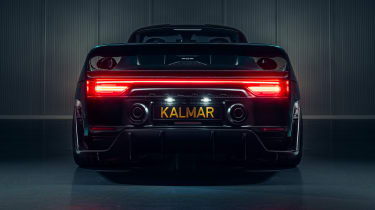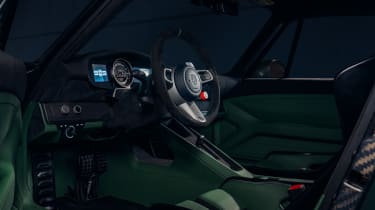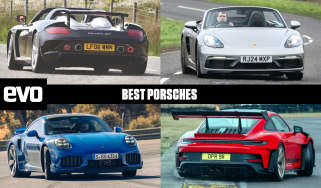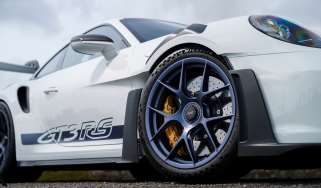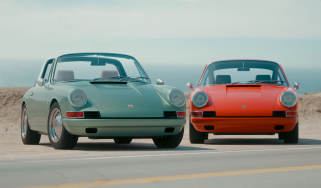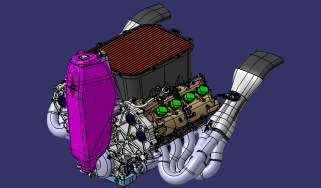Kalmar’s 9X9 is a modern-day Porsche 959 with 917bhp
Estonian engineering firm Kalmar Automotive has revealed its take on the iconic Porsche 959 of the ‘80s
The Porsche 959 was well ahead of its time, with cutting-edge chassis tech, adaptive all-wheel drive and a record-breaking top speed earning it icon status. Almost four decades since it made its debut at the Frankfurt Motor Show, Estonian firm Kalmar Automotive has unveiled its own take on the 959 at The Quail: the 9X9. Available in standard, Sport and Leichtbau forms, just nine examples of each are set to hit the road from July 2025.
The product of a three year development program, the model is said to blend contemporary coachbuilding with the very latest powertrain and chassis tech. While the 9X9 is based on the 993-generation Porsche 911 for homologation purposes (with a rigid spaceframe), each example will adopt running gear from different 992-generation 911s, designed to precisely match the requirements of each buyer.
> The Kalmar 7-97 E-Volt is an electric Porsche 911 with a plant-based body
The ordinary 9X9 is designed to perform at its best on the road, combining a 992 Turbo-derived 917bhp 3.8-litre twin-turbocharged flat-six with Porsche’s excellent PDK transmission and all-wheel drive system. While its power figure makes it ludicrously quick with a claimed 2sec 0-62mph time, Kalmar claims it retains outstanding grand touring capabilities with active engine mounts and optimised intake and cooling systems, much like the 959.
Opt for the 9X9 Sport and you get a 992 Carrera GTS-derived 641bhp 3-litre twin-turbocharged flat-six paired with a seven-speed manual transmission, sending power to all four wheels. A reduction in weight and a retuned chassis are said to make it more engaging than the ordinary car, with buyers able to remove airbags as an option for more focus.
As the name suggests, the Leichtbau (Lightweight) is the most focused of the lot. A claimed 1250kg kerb weight makes it lighter than even the Porsche 911 S/T, with turbocharging ditched for the 992 GT3’s high-revving naturally-aspirated 4-litre flat-six. There’s no automatic transmission as standard, with power sent to the rear wheels only through a six-speed manual; PDK is an option as with the Sport. Kalmar says ‘comfort equipment’ has been ditched in order to achieve this low weight figure, with even airbags removed as standard. This weight figure puts it 95kg ahead of the Sport and 180kg ahead of the standard car.
Also contributing to this is its entirely new, 959-inspired carbonfibre bodywork, weighing just 100kg in total. Coming complete with a recreation of the 959’s iconic integrated rear spoiler, this not only gives the 9X9 a unique look, but also allows for a claimed 1450kg of peak downforce for every model. Kalmar says that simulations indicate it can achieve a 7-minute Nürburgring lap time, putting it in-line with the 991 GT3.
Like the 992.1-generation 911 it’s based on, the cabin combines digital displays with analogue dials for the best of both worlds (although the navigation system and radio have been removed for a more stripped back ambience). Bluetooth remains to allow for phone calls and media playback, with a hidden integrated roll cage and lightweight seats tailor made to fit customers.
Elsewhere, the 9X9 features rear-wheel steering depending on the variant and a bespoke double-wishbone pushrod front suspension setup developed by Italian firm Danisi Engineering; this is compatible with both rear and all-wheel drive applications, and works with adaptive Tractive dampers. Wheels are bespoke magnesium items wrapped in Michelin rubber, with 3D-printed titanium brake calipers from CarboBrake paired with carbon ceramic discs to keep unsprung mass as low as possible.
Jan Kalmar, Founder of Kalmar Automotive, said: 'The 9X9 is Kalmar Automotive’s tribute to one of the greatest road-going sports cars of the millennia, enhanced to the highest possible degree that technology today allows. The result is our creation of a brand-new class of vehicle, retro-hyper-car.'
The Kalmar 9X9 is limited to just 27 units (nine of each iteration) and is available to order now. The first customer car will hit the road in July 2025, with each UK example being sold through DK Engineering.


